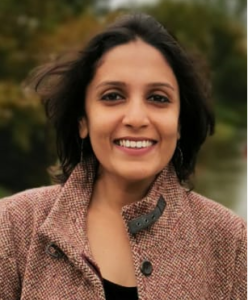 Aardra Surendran, PhD is an assistant professor at the School of Development Studies, Tata Institute of Social Sciences, Mumbai. Her primary areas of interest are the sociology and social history of labour. She is currently interested in contractualisation and labour process with the Indian public sector and its impact on labour mobilization. She also teaches and works on themes of gender, public policy and inequality.
Aardra Surendran, PhD is an assistant professor at the School of Development Studies, Tata Institute of Social Sciences, Mumbai. Her primary areas of interest are the sociology and social history of labour. She is currently interested in contractualisation and labour process with the Indian public sector and its impact on labour mobilization. She also teaches and works on themes of gender, public policy and inequality.
Open Interview brings Aardra Surendran’s interview with Lavanya Shanbhogue-Arvind. In this interview, Aardra speaks on how technology and globalization affected managerial and employment practices. She throws light on how feminist scholarship challenged and shaped this discourse. She also shares how she is documenting the social history of the rise of women athletes from the state of Kerala in its development.
;
;Your work in the area of industrial labour sounds fascinating. Please tell us a little about your research and interests in the sociology of industrial labour.
The study of industrial labour in India has a long history, although it is an uneven history. The passing decades have displayed varied emphases and varying degrees of attention paid to questions of labour. A bulk of the work within sociology, however, has focussed on questions of policy, working conditions, mobilisation and industrial relations. The last two decades have seen the articulation of interest in understanding the social anthropology of industrial work, to see how each of the concerns which have been explored earlier manifest in the everyday lives of workers.
My work tries to contribute to this tradition, by exploring a relatively understudied section of the Indian workforce – public sector workers, and a relatively understudied dynamic in terms of mobilisation – the relationship between trade unions and other forms of worker collectives or associations. I started doing field work on a public sector fertilizer factory in Mumbai in 2012, and have been revisiting the field site to explore newer questions for the last seven years. Although the focus of interest for my doctoral dissertation was permanent workers resident in the factory township, I am currently interested in contractualisation within the public sector and its impact on the labour process and labour mobilisation.
How has technology and globalization affected managerial and employment practices? How do these impact social relations within India’s industries? What does it mean for the average labourer in India’s industries?
At the macro level, the standard explanation that is offered about the introduction of technology concerns changes in the production patterns and subsequent changes in labour absorption, mainly resulting in retrenchment or decline in employment creation. However, two things have to be noted here:
The first is that technological change is not necessarily simultaneous with globalisation; it is a long, differential process, which has proceeded at varying paces in varying industries, particularly in the Indian context. It has definitely been influenced by forces of globalisation, but to understand its specific effects one has to adopt a more nuanced approach on the unevenness of technological change. It is only when we factor in this unevenness are we in a position to understand its impact on managerial practices and social relations within industries. For instance, non – uniform upgradation of technology across different plants in the same industrial unit implies that the labour process changes differentially across them.
Second, the factor most adversely affecting the average industrial worker in today’s India is increasing subcontracting, which has pushed a bulk of the work into the informal arena and beyond the scope of formal frameworks, denying the worker several basic rights. While this tendency has accentuated in the current era, several scholars have pointed to the continuity in this process throughout India’s industrial history. The net result is that while there exists a legal framework which provides some protection to the worker, it does not cover a majority of workers in India. Further, attempts to dilute even this legal framework are ongoing in the name of labour reforms, and the last three years have seen strong protests against this move by the labour ministry.
Feminist scholarship has long lamented and contested the masculinized conception of industrial labour. How has gender scholarship challenged and shaped this discourse? Please throw some light on what it means for India’s women in industries especially since they’re not absolved of household work.
Feminist scholars have offered various useful correctives to standardised notions of the industrial workforce, particularly its male character. Today, we stand tall on the work of scholars who have identified and brought to light the active presence of women industrial workers not only on the shop floor, but also within mobilisational activities. This has had a few significant impacts.
The first is of course in the creation of legal and other formal frameworks that acknowledges and integrates women workers into labour policy. These range from wage standardisation measures, maternity and health benefits as well as the prevention of sexual harassment at the work place.
The second and more interesting impact has been at the level of mobilisation, where gender is emerging as a significant axis of contest. Women workers are raising their voices within and outside conventional platforms of organisation and there is an interesting spectrum to explore in this regard today. For instance, on the one hand, in a historical first, the Centre for Indian Trade Unions (CITU), a large national level trade union federation elected a woman as its president for the first time this year. On the other, hundreds of women garment workers brought Bangalore to a standstill earlier this year demanding minimum wages, better working conditions and protection from sexual harassment at the work place. Thus at the level of institutional leadership as well as initiative to mobilise, one sees the emergence of new trends. However, it must not be ignored that a large majority of India’s workforce is in the informal sector, within which are a significant amount of women, working in low skilled and low paid jobs.
The need to devise organisational strategies to unify this section is equally important, if not more. There has recently been interesting scholarship on attempts to mobilise women workers in the informal sector within the Indian context as well, which is worth our attention.
What about other forms of labour? Please tell us a bit about agrarian labour in the context of vulnerabilities perpetuated by caste. How has Dalit mobilization challenged existing hegemonic forms of social relations?
The question of agricultural labour in India is intricately tied to caste oppression and land, and particularly so in the case of women labourers. There is a line of scholarship that argues that globalisation has fundamentally bettered the conditions of India’s working poor, particularly Dalits. But all available evidence, particularly in the agrarian sector, points to increasing vulnerability for Dalits, who are largely landless labourers.
At the national level this is true for questions of income, access to credit, technology, subsidy and of course land. Whereas past instances of caste atrocities were instances of assertion of caste power based on the near monopoly over agricultural land, contemporary aggression has been seen as a reaction to the limited social mobility that Dalits have attained in some parts of the country, even which is intolerable to the feudal mind set of dominant caste groups. Women’s bodies are often the manifest sites of such violence. Contemporary Dalit mobilisation has offered valuable critiques of both the dominant power structure as well as the existent modes of fighting against it.
Your work on track and field athletes in Kerala is very intriguing. Please tell us about this newer work you’re doing.
The study is being undertaken in collaboration with the Ministry of Sports and Youth Affairs of the Government of Kerala. It is an attempt to document the social history of the rise of women athletes from the state of Kerala during a particular period in its development. There is reason enough to believe that this phenomenon, considered unlikely for a resource poor state like Kerala, can be explained in the context of internal migration, educational and institutional histories of sports as well as policy initiatives of the state, all playing significant roles. Women’s labour and its relationship with caste and religion are being explored centrally as part of the study.
Field work consisted of three large components – first, archival work of the records of the princely states and the Malabar presidency as well as policy documents of the Kerala state government. Second, detailed interviews with generations of athletes, coaches, sports administrators, organisers and journalists. Third, visits to institutions of sports training, sports education and major athletic events held in the state. Track and field athletics has historically been the arena of the working class in India, and its particular relevance to the case of women in Kerala is a story well worth being told.
Note · All the answers/ opinions expressed in this interview/document are of the interviewee.
Cite: Shanbhogue-Arvind, Lavanya (2019 October, 25). Aardra Surendran: Today we stand tall on the work of feminist scholars who brought to light the active presence of women industrial workers. [Blog post]. Retrieved from https://openinterview.org/2019/10/25/aardra-surendran-today-we-stand-tall-on-the-work-of-feminist-scholars-who-brought-to-light-the-active-presence-of-women-industrial-workers/
[Disclaimer, Volunteer, Translate] ![]()
![]()
Courtesy: Prof. Vibhuti Patel, TISS, Mumbai; Design: Santosh C Hulagabali, PhD
 Lavanya Shanbhogue-Arvind is a novelist, TEDx speaker and feminist research scholar and an assistant professor from Tata Institute of Social Sciences, Mumbai. A gold medalist and best student awardee from the said institute. She is also the recipient of WrICE Fellowship from RMIT University, Australia. She was an invited speaker at the Melbourne Writers festival. Her writings on feminist themes have appeared in Griffith Review, Huffington Post, Hindu Business Line, Daily O etc. Many of her write-ups have also appeared on blogs. Email: lavania.shan@gmail.com
Lavanya Shanbhogue-Arvind is a novelist, TEDx speaker and feminist research scholar and an assistant professor from Tata Institute of Social Sciences, Mumbai. A gold medalist and best student awardee from the said institute. She is also the recipient of WrICE Fellowship from RMIT University, Australia. She was an invited speaker at the Melbourne Writers festival. Her writings on feminist themes have appeared in Griffith Review, Huffington Post, Hindu Business Line, Daily O etc. Many of her write-ups have also appeared on blogs. Email: lavania.shan@gmail.com

